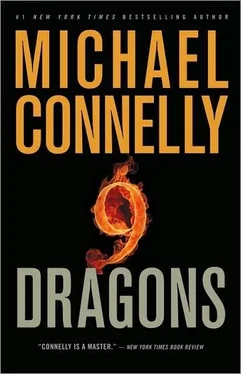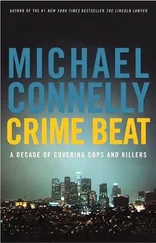“Look, I was trying to make a break in the case and I did. We got the ID.”
“Yeah, we got the ID and hopefully our suspect doesn’t find out about it.”
Chu lowered the binoculars and looked at Bosch.
“I think you’re just pissed because it wasn’t you.”
“No, Chu, I don’t care who makes the break as long as it’s handled right. Showing my cards to people I don’t know is not my idea of good case management.”
“Man, don’t you trust anybody?”
“Just watch the club,” Bosch responded sternly.
Chu put the binoculars back up as instructed.
“I trust myself,” Bosch said.
“I just wonder if this is something to do with me and Tao. Whether that’s the issue.”
Bosch turned toward him.
“Don’t start that shit again, Chu. I don’t care what you’re wondering. You can go back to AGU and stay the hell out of my case. I didn’t call you out in the first-”
“Chang just took a call.”
Bosch looked at the club. He thought he saw the man Chu had identified as Chang with a phone to his ear. He then dropped his arm.
“He put it away,” Chu said. “The number’s good.”
Bosch backed out of the space and started back to the super-market.
“I still don’t know why we’re fucking around with a phone number,” Chu said. “Why don’t we just go pick the guy up? We got him on tape. Same day, same time. We use it to break him.”
“And what if he doesn’t break? We’re left with nothing. The DA would laugh us right out the door if we went in with just that tape. We need more. That’s what I’m trying to teach you.”
“I don’t need a teacher, Bosch. And I still think we can turn him.”
“Yeah, go home and watch some more TV. Why the fuck would he say a single word to us? These guys are told from day one, you get popped, you say nothing. If you go down, you go down and we’ll take care of you.”
“You told me you never worked a triad case before.”
“I haven’t but some things are universal and this is one of them. You get one shot at these cases. You have to do it right.”
“Okay, so we do it your way. What’s next?”
“We go back to the parking lot and cut your friends loose. We’ll take it from here. It’s our case, not theirs.”
“They’re not going to like that.”
“I don’t care if they like it or not. That’s the way it’s going to be. You figure out a way of letting them down nice. Tell them we’ll bring them back in when we’re ready to make a move on the guy.”
“Me?”
“Yeah, you. You invited them in, you invite them out.”
“Thanks, Bosch.”
“Any time, Chu. Welcome to homicide.”
Bosch, Ferras and Chu sat on one side of the meeting table across from Lieutenant Gandle and Captain Bob Dodds, commander of the Robbery-Homicide Division. Spread across the polished surface between them were the case documents and photographs, most notably the shot of Bo-Jing Chang from the Fortune Liquors security camera.
“I’m not convinced,” Dodds said.
It was Thursday morning, just six hours after Bosch and Chu had ended their surveillance of Chang, with the suspect going to an apartment in Monterey Park and apparently retiring for the night.
“Well, Cap, you shouldn’t be convinced yet,” Bosch said. “That’s why we want to continue the surveillance and get the wire.”
“What I mean is, I’m not convinced it’s the way to go,” Dodds said. “Surveillance is fine. But a wire is a lot of work and effort for long-shot results.”
Bosch understood. Dodds had an excellent reputation as a detective but he was now an administrator and about as far removed from the detective work in his division as a Houston oil executive is from the gas pump. He now worked with personnel numbers and budgets. He had to find ways of doing more with less and never allowing a dip in the statistics of arrests made and cases closed. That made him a realist and the reality was that electronic surveillance was very expensive. Not only did it take double-digit man hours to carefully draft a fifty-plus-page affidavit seeking court permission, but once permission was granted, a wiretap room had to be staffed twenty-four hours a day with a detective monitoring the line. Often a single-number tap led to other numbers needing to be tapped and under the law each line had to have its own monitor. Such an operation quickly sucked up overtime like a giant sponge. With the RHD’s OT budget seriously down because of economic constraints on the department, Dodds was reluctant to give any of it up for what amounted to an investigation of the murder of a south side liquor store clerk. He would rather save it for a rainy day-a big-time media case that might come up and that would demand it.
Dodds, of course, would not say any of this out loud but Bosch knew, just as everyone else in the room knew, that this was the issue the captain wrestled with and which left him unconvinced. It had nothing to do with the particulars of the case.
Bosch took one last shot at convincing him.
“This is the tip of the iceberg, Captain,” he said. “We’re not just talking about a liquor store shooting. This is just a doorway. We could take down a whole triad before this is over.”
“Before this is over? I retire in nineteen months, Bosch. These sorts of things can last forever.”
Bosch shrugged.
“We could call in the bureau, go partners. They’re always up for an international case and they’ve got money to spend on wiretaps and surveillance.”
“But we’d have to share everything,” Gandle said, meaning the spoils of the bust. Headlines, press conferences, everything.
“I don’t like the idea of doing that,” Dodds said as he held up the photo of Bo-Jing Chang.
Bosch threw in his last card.
“What if we did it without overtime?” Bosch asked.
The captain was holding a pen in his hand. It probably reminded him of his authority. He was the one who signed off on things. He twiddled it now as he considered Bosch’s unexpected question but quickly shook his head.
“You know I can’t ask you to do that,” he said. “I can’t even know about that.”
It was true. The department had been sued so many times for unfair labor practices that no one in administration would ever give even tacit approval to detectives working off the clock.
Bosch’s frustration with budgets and bureaucracy finally got the best of him.
“Then, what do we do? Bring Chang in. We all know he’s not going to say a word to us and the case will die right there.”
The captain wiggled his pen.
“Bosch, you know what the alternative is. You work the case until something breaks. You work the witnesses. You work the evidence. There’s always a link. I spent fifteen years doing what you’re doing and you know there is always something. Find it. A wiretap is a long shot and you know it. Legwork is always the better bet. Now, is there anything else?”
Harry felt his face growing red. The captain was dismissing him. What burned was that deep down Bosch knew Dodds was right.
“Thanks, Captain,” he said curtly and stood up.
The detectives left the captain and the lieutenant in the conference room and convened in Bosch’s cubicle. Bosch threw a pen he was carrying down on his desk.
“Guy’s an ass,” Chu said.
“No, he’s not,” Bosch quickly said. “He’s right and that’s why he’s the captain.”
“Then, what do we do?”
“We stay with Chang. I don’t care about overtime and what the captain doesn’t know won’t hurt him. We watch Chang and we wait for him to make a mistake. I don’t care how long it takes. I can make a hobby of it if I have to.”
Читать дальше












